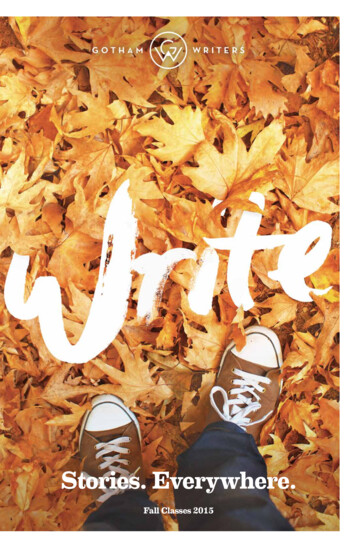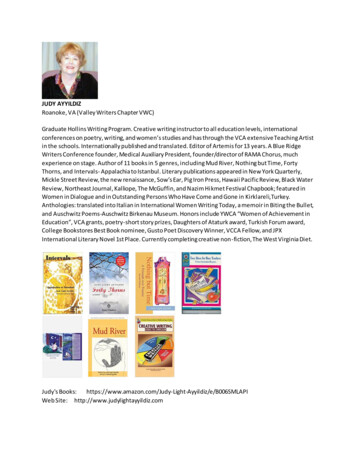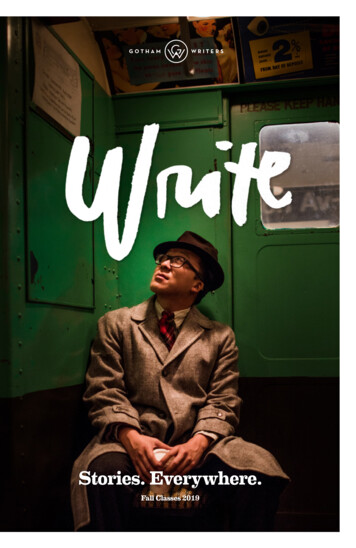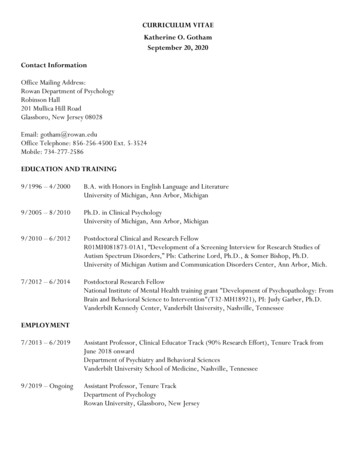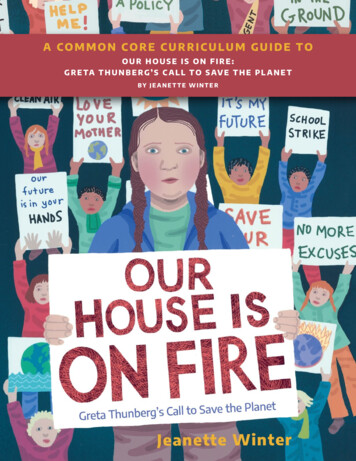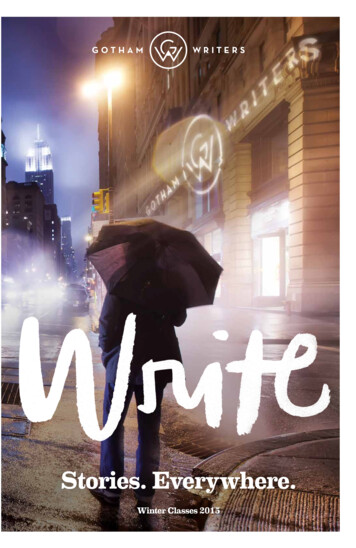
Transcription
Stories. Everywhere.Winter Classes 2015
W E WA N T Y O U R S .Gotham Writers Workshop is a creative home in New YorkCity and online where writers develop their craft and cometogether in the spirit of discovery and fellowship. We’ve beenteaching creative writing to students since 1993.We believe that everyone has a story to tell. Indeed, manystories. Keep your eyes and mind open and you will find themeverywhere. And we can help you tell your stories better.Whether you’re a new writer looking to explore, or anexperienced writer looking to strengthen your skills, ourclasses will help your reach your goals—through clearinstruction on elements of craft, critique in a safe environment,and a structured process that keeps your work on track.GOTH AMWRIAMWRITET E RS .COM! @GOT HAM W RI T ERSCO N TACT@ G OT H A MW R I T E R S .CO MWe also teach Business Writing, with the same verve andexpertise we bring to our creative writing courses.We strive to give each student the best possible learningexperience. Class size is strictly limited so you never get lostin a crowd. And our instructors are consistently excellent—working writers who are as skilled at teaching as they are atwriting.We are invested in helping students find the writing class thatis most appropriate for their particular needs. Explore ourwebsite, and feel free to discuss options via email or phone.Thousands of people have been enriched by the Gothamexperience. It’s why we’ve been around for over twenty years.2 12–974 – 8 37 7
CoursesWays to LearnFictionNonfictionScriptwritingComedy, Poetry & SongWith only words and the reader’simagination, a work of fiction cansail across the world in pursuit of awhale or zero in on a few minutes inline at the local bank, luring us intoa story that feels real.Whether it’s an experiencefound in your kitchen or halfwayaround the world, whether it’s anidea you can’t forget or a conversation with a fascinating person,sometimes the most intriguingstories are true.We all like to be entertained,whether it’s watching a performance live on stage or flickeringon a screen. Here’s where youlearn to write the material thatholds those audiences in thrall.Send words soaring in the lyricism of poetry or song. Or getpeople high on laughter throughstand-up comedy or humorousprose.FICTION/NOVELIn-person classes in NYC.POETRYSCREENWRITINGSONGWRITINGCHILDREN’S BOOKSCREATIVE NONFICTION 101TV WRITINGHUMOR WRITINGSCIENCE FICTION & FANTASYMEMOIRPLAYWRITINGSTAND-UP COMEDYMYSTERYESSAY & OPINIONDOCUMENTARY FILMROMANCEPERSONAL ESSAYSCRIPT ANALYSISREADING FICTIONARTICLEOnline classes draw togetherwriters from across the globe.NYC CLASSES BEGIN THROUGHOUTDECEMBER, JANUARY, AND FEBRUARY.MANY OF THEM BEGIN THEWEEK OF JANUARY 12.ONLINE CLASSES BEGIN THROUGHOUTDECEMBER, JANUARY, AND FEBRUARY.TRAVEL WRITINGFOOD WRITINGEssentialsProfessional DevelopmentTeen ClassesOne-on-One10-Week Workshops6 -Week ClassesSelling SeminarsIntensivesCreative Writing 101 is an idealstarting point for writers, to testthe waters or wash off the rust.The other courses here focuson crucial aspects of the writing craft, useful for all types ofwriting.If you want to be taken seriously,these courses sharpen your skillsin the workplace, or help youbuild a platform as a writer, orguide you through the tricky taskof publishing your work.Pressure-free, creativity-stretching,not-like-school courses for writersages 13-17. Useful for expandingyour talent or gaining skills boundto help with essays and schoolwork.It’s wonderful to learn in a groupsetting, but sometimes one-on-oneis the right match. You may wanta private class, or “doctoring” on aspecific project, or a professionalmentor to guide you, or one of ourspecialty arrangements.These classes use a combination oflectures, exercises, and workshopping (critiquing of student projects).In New York City, they meet forthree hours per week; online, eachsession begins at the same timeeach week, and unfolds graduallyall week long. Available in Level I,Level II, and, periodically, Level III.These classes let students explorea variety of forms and concepts ina low-pressure manner, througha combination of lectures andexercises. In New York City, theymeet for three hours per week(two hours for Business Writing);online, each session begins at thesame time each week, and unfoldsgradually all week long. (Timingand price is different for BusinessWriting.)These courses emphasize thebusiness side of writing. The NewYork City versions take place overtwo three-hour sessions. The online versions take place over fourweeks.In NYC, these are seven-hourcrash courses, taking place all inone-day. The online versions takeplace over three weeks.UNBOUND: CREATIVE WRITINGBUSINESS WRITINGTRUE STORY: CREATIVE NONFICTIONCREATIVE WRITING 101HOW TO BLOGDOCTORING— BOOK/STORY/SCRIPTCHARACTER DEVELOPMENTHOW TO GET PUBLISHEDMENTORSHIPSDIALOGUE WRITINGNONFICTION BOOK PROPOSALPRIVATE SESSIONS AND CLASSESWRITE IT RIGHT! (GRAMMAR)HIT SEND: PUBLISHING SHORT NONFICTIONCOLLEGE ESSAY COACHINGTHE WRITER’S MINDMFA APPLICATION ASSISTANCETHE EDITOR’S EYEBLOG LAUNCH 420 — NYC 399 — Online 125 159 299IN (VERSE): POETIC TECHNIQUES FORNON-POETSPROMPT-A-THONONLINE VIDEOSOCIAL MEDIAYOGA FOR WRITERSRegistration fee for all classes: 25 paid once per term.GOTH AMWRI T E RS .COM! @GOT HAM W RI T ERSCO N TACT@ G OT H A MW R I T E R S .CO M2 12–974 – 8 37 7
Illustration: Joe Linton“If you wantto changethe world pick upyour penand write.”—Martin Luther16 th century monk and professor
Gotham FacultyStudent VoicesWRITING WHAT YOU DON'T KNOWFaculty InsightBY SUSAN BRE E NI consider myself an autobiographical fiction writer. Myprotagonists tend to be middle-aged white women, likeme. They grapple with subjectsclose to my own experience,such as the challenges of teaching a fiction class in Manhattan.Or struggling in a relationshipwith a mother when anger getsin the way. I’ve found power inwriting about what I know, because I have something to sayabout it. The well does not rundry. Usually.authoritative demeanor, and Ithought, Hmm. He would work.Then I became unconscious.When I came to, the imageof what this man looked likestayed in my mind, preoccupying me, and I thought, Allright, all I have to do is transfer this man into my novel. Howdifficult can it be to create anIndian character?But when I began work onmy new novel, I found myselfstymied. Specifically, I needed my protagonist to fall inlove, but no candidates cameto mind. I’d been successfulwith my romantic hero in TheFiction Class, but didn’t wantto restrict my literary careerto women loving unreliable,charming men. I needed tofind someone else, someonedifferent, for my protagonist tofall in love with, and for me tofall in love with too, becausethat’s how it seems to work.So I wandered the streets ofNew York, considering likely prospects. I found a bunchof glossy, good-looking menin suits, but I needed someone who came with a story. IfI was going to spend 300 pages with this man, he had to beinteresting.The size of the challenge became clear the moment Ihad to pick the character’sname. If I were writing aboutan American man, I wouldknow intuitively that namingsomeone Burt would conjureup a very different image inthe reader’s mind than if I’dnamed him Sydney. I wouldunderstand the nuances ofclass and region associatedwith the name. But with anIndian man, I was stuck. Ofcourse, the simple thing wouldhave been to ask an Indianfriend to give me a good name,but I worried if I delegated toomuch to friends, I’d lose control of the character. I wantedto figure it out myself.Then, I needed to have surgery. It was fine, it all cameout right, but before I wentunder I happened to look upat the anesthesiologist, an attractive Indian man with anThree years later, I cananswer that question: It’scomplicated.Where to begin?I turned to novels, because Ibelieve that people are neverso truthful as when they writefiction. (No disrespect meantto memoir writers, whom Ilove, for other reasons.) SoI went to the library and began reading through novelswritten by Indian men. Therewere the big names, of course:Salman Rushdie and AmitavGhosh and Vikram Seth. ButI stumbled on many more obscure ones too. As I read, Ibegan to get a sense of someof the issues an Indian manmight be thinking about: family, honor, caste, community. Reading fiction gave me avocabulary.I decided my character wouldbe from northwestern India.Men from the Punjab statewere often referred to as theNew Yorkers of India: strong,aggressive, arrogant. As a NewYorker myself, I felt I couldrelate.Then, I began reading histories of India. I wanted to geta sense of what my characterwould know, in a very basicsense. For example, I knowGeorge Washington was ourfirst President. What mightKamal know (because I haddecided to name my character Kamal Kapur) that wouldbe so basic he wouldn’t evenneed to think about it? Hewould know about the TajMahal, and he would probably know that it was builtaround the same time asthe Pilgrims stumbled uponPlymouth Rock. This wouldbe a source of pride to him.He might even boast aboutit, a bit, in conversation withmy protagonist, Tilda Banks,a white, middle-aged memoir coach. (All right, I didn’tmove too far away from homewith that character.).Then I decided to tackle language. Kamal is fluent inEnglish; although born inIndia, he lives and works inHempstead, New York. Yet, Ifelt sure he’d have been exposed, as a child, to Hindi.Happily, Rosetta Stone washaving a sale on its Hindi lessons. (Had they been havinga sale on Marathi, he mighthave spoken that.) I didn’t expect to become fluent, and, infact, after two years of concentrated study, the only thingI can say in Hindi, with anything like authority is, “I havea red dog.” Mere khota lal hai.But I was curious about thepatterns of Kamal’s speech.Someone who grew up speaking Hindi would shape hissentences in a particular way,I thought. In fact, sentences inHindi are structured in a subject-object-verb way. So, whatin English might be, “I needmoney,” would become inHindi, “I money need.” Whenangry or upset, Kamal revertsto that way of speaking.By this point, I was beginning to get a real sense of whoKamal was. I really wantedto go to India, and hope to dothat soon, but meanwhile, Idiscovered something else exciting: Bollywood. Movies tella lot about what a culture values. Think of all those independent cowboys in Americanmovies. Watching Bollywoodgave me a richer sense of howan Indian man might see theworld. How might he act ona date? How would he move?What gestures would he use?What sort of man is considered handsome?The final big issue I threwmyself into was religion andhere I stuck to something Iknew. I made him Christian.I did consider, for a few moments, making him Hindu,but thought that on top of everything else, if I had to studythe Hindu religion, I wouldn’tbe done writing this bookfor a decade. Also I wantedto explore the ways being aChristian affected him, as anIndian. I’ve always been curious about missionaries, whichis how Kamal comes to be theson of one.So, here he is: Kamal Kapur,born in 1970, in Ludhiana,which is the Punjab regionof India. Son of a father whodied young of a heart attackand a woman who went onto become a missionary. Alithe, good-looking man withthe dimples of Bollywood starShahrukh Khan. A little vain.Serious about his hair. A manwho enjoys people and worksin investor relations, whocould have been a doctor butdevoted himself to his daughter instead. And yes, dearreader, I love him.This article first appeared atComposeJournal.com.Susan Breen is the author ofthe novel The Fiction Class.SEE MORE FACULTY ARTICLESAND PROFILES ON OUR WEBSITE.“I can honestly say thatwith the help I receivedfrom Gotham, I’vemy voice,improved my craft, and amnow living my dream.”—Susan Liwanag, designer/writersoon finding a natural aptitude for bass guitar.Tony is s self-taught musician, with a workshop hereand a lesson there, which he acknowledges comeswith both advantages and disadvantages. “I grew upin New York and made all of my mistakes in public—on the biggest stage in the world,” he says. “On the flipside, you learn in the pressure cooker that is New York,which is good. You can really test yourself.” And evenwithout formal training, Tony has worked in multipleindustries—theater, television, and film. Whether inthe orchestra pit at a Broadway musical or scoring aspecial for A&E or a film, Tony has done it all.TONY CONNIFFFaculty ProfileBY BRIT T GAM BI NOGotham Songwriting teacher Tony Conniff has beenplaying the bass guitar since he was a teenager—when his band’s bass player got busted for smokingpot and his parents forced him to leave. Tony was“deputized” to take over. “It found me,” Tony says,GOTH AMWRI T E RS .COMTo get involved in music in a larger way than “justbeing one of the musicians,” Tony fulfilled his ambition to become a producer. He and a friend started aproduction company, bought an eight-track recorder,and began recording themselves. Later, Tony got hisown studio where he’s been playing, recording, andproducing music for more than twenty years now.The one downside of producing? “I’m behind the curtain, so I don’t usually get to see the effects music hason people,” Tony says.In 2001, Tony started teaching at Gotham. “One ofmy fears was that old saying, ‘those who can’t do,teach’ would come true for me,” Tony says. “But Idiscovered it was the exact opposite. I found thatteaching brought me closer to my own work. It’sbeen great to work with other people. It’s like anenhancer.”In the classroom, Tony encourages his students tofind their voices. “I’m not a voice teacher, don’t getme wrong,” he says. “But the singing is part of songwriting.” His goal is to create a safe space for studentsnot only to write, but to perform their songs—evenif it’s just humming. “You have to think musically,even if you never sing the song yourself,” Tony says.“There’s a lot of freedom in a song, but there’s also alot of discipline.” (And to his credit, many of Tony’sstudents who claimed they weren’t good singers arenow singing in clubs and releasing music.)As a freelance producer, Tony has worked with avariety of artists, including spoken word poet AlixTeaching also affected Tony on a personal levelOlson. He collaborated with her on the album Builtduring the aftermath of 9/11. He lived only a coupleLike That both as a producer and songwriter. Knownhundred feet away from the World Trade Center atfor her outspoken and uncompromising political bethe time and as a result, his apartment was renderedliefs, Olson is sometimes perceived as an “angry” artuninhabitable. He found himself homeless, but sevist, but Tony calls her one of the sweetest people he’seral Gotham teachers banded together and took Tonyever met. In fact, Tony once said he hoped his daughter would grow up to be like her. “And in a weird way, in until he got temporary housing. “That’s when Irealized Gotham was also a community,” Tony says.it worked out,” he says. “My daughter is actually a socially conscious person and works as a social worker.” “Not just a school.”@GOT HAM W RI T ERS“Anlearningenvironment.”—Jeff Vande Zande, community college professor“A very eye-opening experiencethat has allowed me to realizethat there are other ways oflooking at the world and in-turntaking those perceptions andwriting something about them.”—Stephanie Eilebrecht, data entry specialist“It was an absoluteand quiteinspirational.”—Elise Brancheau, opera singer“The best writing class I’ve evertaken. Sign up now, like rightnow, before it fills up and you getwaitlisted.”“You meet people of all ages, all walks oflife from all over the world. The courseis rich not only because of the excellentinstructors, but because of the fellowstudents.”—Kay Berryman, retired—Edward McNamara, chefCO N TACT@ G OT H A MW R I T E R S .CO M2 12–974 – 8 37 7
CommunityWrite Now91THEWORDMEMOIRWRITINGDo you wish there was a place you could go for writinginspiration and practice? Where you could hang out withother writers? Without needing to make a long-termcommitment or spend a lot of money?CONTESTGotham Write-Ins are that place.HERE’S WHAT HAPPENS: The teachergives an interesting writing prompt.Everyone writes for a while. Thosewho want to read aloud their work.We take a break and socialize overrefreshments. Then we repeat theprocess. No pressure. Just freewheeling creativity.You can sign up in advance or justdrop in.FRIDAY EVENINGS IN MANHATTAN6:30–8:30pmThe 91-Word Memoir Writing ContestTHE INSPIRATION: This annual contestcelebrates longtime Gotham studentand writer Norma Crosier who dieda few days short of her 91st birthday.THE CHALLENGE: Tell a story fromyour life in 91 words or fewer.THE PRIZE: The winner gets a freeGotham class.TO GIVE YOU AN EXAMPLE,HERE IS LAST YEAR’S WINNER:“Truck-Stop Gift Shop”When I was six, I stood in a truckstop gift shop staring at Land ofLincoln ashtrays. Waylon Jenningscrackled from an AM radio, and Ismelled biscuits baking. The doorabruptly opened, and the shop filledwith diesel fumes and cigarettesmoke trailed by one of the men thatmy mother considered a gentlemancaller, 70s trucker-style. She woulddisappear into the darkness withhim, and I would stare at collectiblespoons with handles in the shape ofIllinois.—Virginia Catalano,New York, New YorkFor competition rules and online entry form,— visit —GOTHAMWRITERS.COM/91CONTESTSATURDAY AFTERNOONS IN BROOKLYN12:00–2:00pm 20 per session 45/3-session packageSee our website for details.MAKELISTSWe do free classes and other fun thingsaround New York City—at bookstores, bars,Bryant Park, etc. It’s our way of showcasingwhat we do and getting to know you. See ourwebsite for upcoming events.You have far more story material insideyour mind that you are aware of. A greatway to locate potential story ideas is tomake lists. Try it. You’ll be amazed atwhat you find. For example MAKE A LIST OF:5 OR MORE topics that you’re anexpert at.5 OR MORE people that you havecrushed on.5 OR MORE places about which youfeel trepidation.5 OR MORE personal moments oftriumph.5 OR MORE things you would nevertell anyone.!GOTH AMWRI T E RS .COM@GOT HAM W RI T ERSCO N TACT@ G OT H A MW R I T E R S .CO M2 12–974 – 8 37 7
Stories are, truly, everywhere—every placeyou look, everyone you meet, everythingyou experience. Every day is filled withhundreds of potential stories awaiting yourimagination and craft.Each month we invite you to post a story on Twitter at#storieseverywhere. Your stories (which can be true or made up) willbe inspired by what you see, know, or do, and they should relate in someway to these monthly “themes”:decemberSomeone you recently met.januaryTough choice.februaryThrough a window.At the end of each month, we will pick our favorite and reward thatperson with a free Gotham writing class.Your story must be no longer than 140 characters, including spaces andthe hashtag #storieseverywhere. Like this:The pastor’s daughter made me meet her in the church basement. Therewas no light but she told me where to duck. #storieseverywhere(by Tami Absi)Everyone has a story. Especially you. 7
Gotham Writers Workshop is a creative home in New York City and online where writers develop their cra % and come together in the spirit of discovery and fellowship. We’ve been teaching creative writing to students since 1993. We believe that everyone has a story to tell. Indeed, many storie
